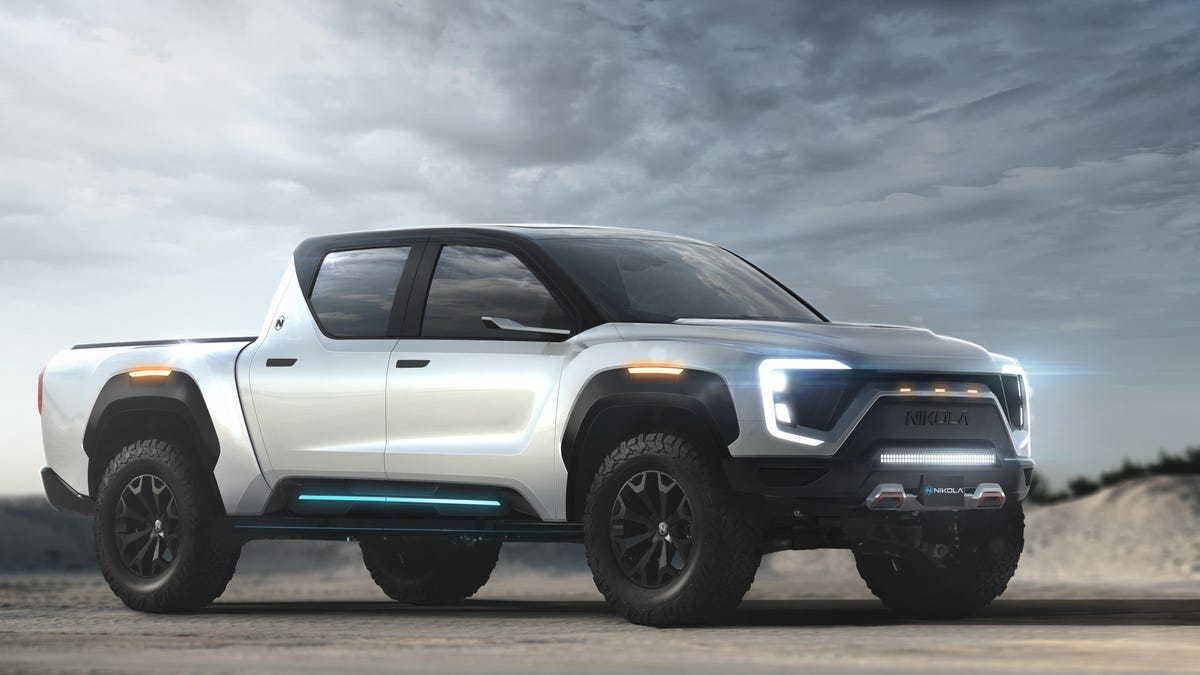The electric pickup trucks that may change your mind about diesel
Tesla's Cybertruck is far from the only one to watch.

The Nikola Badger uses the other half of Nikola Tesla's name and two electric power sources: Fuel cell and battery.
All of a sudden the biggest story in electric cars is trucks: Electric pickup trucks. Here's what's coming, who will make them, and why you may stop sneering and want one.
So many electric trucks coming
The world gawked when Tesla unveiled its futuristic-but-fragile Cybertruck. It promises acceleration that will drop most Porsches, towing that will embarrass any F-150 (though Ford, as you can imagine, strongly disputes that claim) and looks that you can't get anywhere else.
A cutaway of Rivian's "Skateboard," which combines all of the drive components, the battery, the brakes and suspension.
But a year before Tesla's truck debuted, Michigan startup Rivian really kicked off the electric pickup era with the debut of its $69.000 R1T boasting up to 750 horsepower, 11,000 pounds towing, a 3-second 0-60 time, and quad-motor all-wheel drive. Since then it's won a commitment to make 100,000 electric delivery vans for Amazon and a half billion dollar investment from Ford, which itself promises an electric F-150 that recently did a stunt pull of a 1 million pound freight train.
Rivian's credibility is so strong that it garnered a commitment for 100,000 electric delivery vans from Amazon and a half billion dollar investment from Ford -- before Rivian's delivered a single truck.
GM announced it's bringing back the Hummer as the exact opposite of the gas-guzzling troglodyte it used to be: The name will grace a brawny, 400 mile range electric pickup.
Want more? Add in startup trucks like the Lordstown Endurance with four in-wheel motors and a base price of $52,500, the Atlis XT promising up to 500 miles of range and 15 minute charges for a base price of $45,500, the aluminum Bollinger B2 pickup with its Defender aesthetics and stout price of $125,000, or the Nikola Badger, a 1,000-horsepoter, 1,000 lb-ft pickup with a combination battery and fuel cell powertrain.
But what's the point?
This is a real trend, but most truck buyers will still ask the same question: Why? Electric trucks will come at them with five answers to that question.
Massive torque. Torque is fun in a car but essential in a truck, where the name of the game is often grunt, not speed. The new electric pickups toss around four-figure torque and HP numbers like that's normal. But torque is just what electric motors do by nature.
True discrete AWD. Commonly equipped with quad motors, electric pickups give you the holy grail of perfect, intelligent 4-wheel drive without the clunky driveshafts, transfer cases and locking hubs of a conventional 4x4 pickup. But these trucks are going to need that space and weight savings for the battery.
Job site power. Trucks go to work, and the big battery that powers them can also be a great job site power source. Hercules goes so far as to offer 15, 20 and 30-amp AC outlets.
Normally one has to lug a big generator to the job site to get robust 20A and higher outlets. But many new electric pickups will offer them in the bed, powered by an integrate inverter tapping the vehicle's battery
MPG and emissions. While they've certainly gotten cleaner and more efficient, full-sized trucks are generally the MPG and emissions laggards in an automaker's lineup. Each customer they can move from a combustion truck to an electric one is a big win in terms of hitting ever-tightening corporate emission and fuel economy targets.
Pricing. Trucks are already expensive, and making one electric will only raise the cost, especially if it's an electric version of an existing conventional like Ford's pending electric F-150. One school of thought says that it's easier to "bury" part of the cost of electrification in the sticker price of a truck that already costs an average of $51,000. The other school of thought is that trucks are already at the high end of what the vast majority of consumers can afford and that there's no head room beyond that. But as you noticed from the above list of trucks above, some of them aim to come in at competitive prices.
If electric trucks have an Achilles heel it might be at the intersection of range and towing capacity: It remains to be seen in the real world how much these trucks' range decreases when pulling something heavy. And a lot of potential owners live in places where a drive to work could be 50 miles or more each way down roads where charging locations aren't exactly plentiful. Combine all those factors with use of the truck's battery at the job site and you could have a more complex case of range anxiety. But trucks are the high-limit table in the auto industry casino, so let's see who has the strongest hand as these big guys arrive.
First published March 24.

